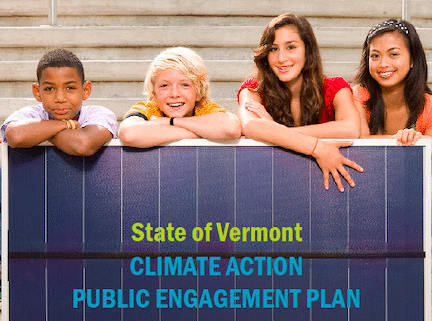In 2021, Climate Access partnered with the Agency of Natural Resources and Rise Consulting to develop Vermont’s first-ever Climate Action Plan and the Comprehensive Energy Plan. The Climate Action Plan guides the efforts across the state to cut carbon pollution and prepare for a changing climate. The Comprehensive Energy Plan informs the Climate Action Plan and provides guidance on Vermont’s energy policy direction.
In this project, Climate Access led public participation efforts. The organization engaged over 1,000 Vermonters in discussing climate solutions and how to prepare their communities for climate impacts. The response from community members along with the input from stakeholders representing different sectors of the community, set priorities for the state to take action.
Approach
In June-July 2021, Climate Access and Rise Consulting conducted a series of interviews and roundtable dialogues with stakeholders to inform the development of the engagement plan while sharing climate change concerns and solutions to include in the Climate Action Plan. The powerful roundtable discussions included a meeting with BIPOC leaders and a discussion with several sector leaders.
The dialogue with BIPOC leaders was created in recognition that BIPOC communities experience specific vulnerabilities to climate change and that Vermont has disparities in environmental justice, health outcomes, and other state systems.
Unfortunately, the original dialogue scheduled with BIPOC leaders was disrupted by a select few Vermont residents because it was a BIPOC space. The meeting was rescheduled due to safety concerns and the rescheduled meeting only saw about half of the participants that originally signed up. However, even with these unforeseen issues, the meeting resulted in a vital discussion that proved how important it is to have these particular spaces where BIPOC community members can use their voice for action.
In this project, Climate Access approached public engagement with the organization’s method of co-exploring risks and responses to climate change with community members as partners in developing and implementing climate solutions while meeting the needs of community members including those most affected by the climate crisis. This approach ensures that residents have a voice in the decision making process of the state’s climate action plan.
In partnership with the Agency of Natural Resources, Climate Access and Rise Consulting designed and facilitated a series of engagement events; 4 in-person events and 3 online sessions. All public engagement events included over 500 attendees. The organization was able to turn dense and complex policy information into clear and accessible materials used to spark important conversations at engagement events. The in-person events took place in strategic locations to reach different communities across the state. In addition, Climate Access surveyed over 600 Vermont residents as well as distributed a public comment form that received more than 300 comments.
Other engagement efforts included an online survey with almost 700 responses and public comments on climate impacts with over 300 comments. Climate Acess’s engagement efforts successfully engaged many Vermonters from different regions of the state despite an accelerated timeline where the final plan was released early instead of a draft plan that would have offered an opportunity for additional public comment.
Listening to the Community
Vermont and the world are facing the impacts of climate change and it’s time to act. The initial Vermont Climate Action Plan, released on December 1, 2021, outlines steps to cut climate pollution and help Vermonters prepare for extreme weather and other impacts caused by climate change. Vermont must get ready for a changing climate and cut its climate pollution, such as carbon and methane emissions, in half by 2030 to meet the target in Vermont’s Global Warming Solutions Act. To do this, Vermont will need to prioritize helping the people who will be most affected by climate change. The Legislature established the Vermont Climate Council to draft the plan. As they drafted the plan, the Climate Council incorporated ideas and feedback from a wide range of Vermonters.
Analyzing the input of Vermonteers through all the engagement efforts, there are several themes that stand out including transportation improvements by providing access to cleaner vehicles and public transit which is addressed in the Climate Action Plan. The plan lays out the following strategies:
- Replacing carbon intensive fuels (gas and diesel) with zero emission or low carbon fuels such as electricity (noting that for medium to heavy duty vehicles in particular, there may be a limited but important role for biofuels or hydrogen, especially in the near term).
- Making both the vehicles and the transportation system more efficient and accessible; creating options for Vermonters to drive less or use alternatives to the single occupancy vehicle to get where they need to go, while also expanding options for those who cannot drive.
Through all events, equity was a core concern. This came through at all events, via the survey and public comment portal. In particular, the impact of climate change and energy transition on youth, low-income Vermonters and BIPOC community members was expressed. As such the Climate Action Plan addresses the BIPOC community and their specific issues in the state throughout their strategies and bold actions in the plan.

